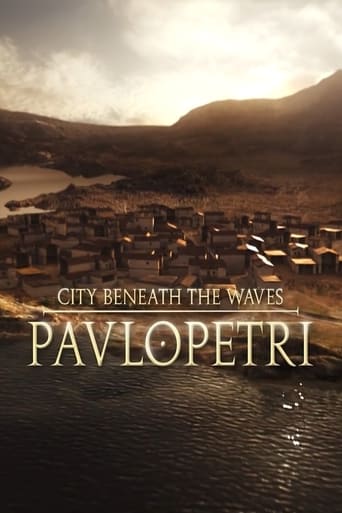

Pavlopetri: The City Beneath the Waves (2011)
Just off the southern coast of mainland Greece lies the oldest submerged city in the world. It thrived for 2,000 years during the time that saw the birth of western civilisation. An international team of experts is using cutting-edge technology to prise age-old secrets from the complex of streets and stone buildings that lie less than five metres below the surface of the ocean. State-of-the-art CGI helps to raise the city from the seabed, revealing for the first time in 3,500 years how Pavlopetri would once have looked and operated.
Watch Trailer
Cast
Reviews
Instant Favorite.
Better Late Then Never
It's fun, it's light, [but] it has a hard time when its tries to get heavy.
I wanted to like it more than I actually did... But much of the humor totally escaped me and I walked out only mildly impressed.
Endless shots of cars, people in cars, helicopters, people in helicopters, expensive tech, people carrying expensive tech. A never ending diet of increasingly tiresome superlatives, every 'find' is wonderful, amazing, important, astonishing. Is archaeology really like that? No it isn't.The most disturbing thing about the whole film was the reckless extrapolation. They find the bottom of a vase, and immediately, before our very eyes, the computer constructs the vase itself. It's pure bullsh*t of course. The base they have found resembles the bases of other vases found elsewhere which look like the computer graphic we are shown. Similarly, we are shown 're-constructions' of two storey houses from the foundations. These buildings are assumed to have been timber framed buildings to resist earthquake damage (it's an earthquake region). A reasonable assumption, but there is no direct evidence whatsoever of the actual heights of the buildings. If they were stone built then relative heights could be partially deduced from the amount of spoil around the foundations, but they aren't, so it's guesswork and extrapolation. This is particularly disturbing as it is unclear whether then city was Greek or Minoan, or a bit of both over time. In which case, what would the style of the buildings have been? I don't doubt that if the producer had allowed them, the contributors could have given us a catalogue of interesting arguments to back their extrapolations, but that would be facts, and the modern BBC hates facts. I also doubt that the main presenter gives lectures that are a stream of undiluted superlatives (or his students would throw rocks at him, at least verbally), I have the impression that left to his own devices he is an interesting and engaging speaker. It all comes down to the BBC belief that all programs must be 'accessible' to people with low IQ and a negligible attention span, who won't bother to watch it anyway.
The city of Pavlopetri, underwater off the coast of southern Laconia in Peloponnese, Greece, is about 5,000 years old, and is the oldest submerged archaeological town site. The name Pavlopetri ("Paul's and Peter's", or "Paul's stone") is the modern name for the islet and beach, apparently named for the two Christian saints that are celebrated together; the ancient name or names are unknown.First discovered by British archaeologist Nicholas Reynolds in 1967, and mapped out a year later by a group of experts from Cambridge University, it is unique in having an almost complete town plan, with streets, buildings and tombs.Paul Olding's film traces the efforts made by Nottingham University archaeologist Jon Henderson, with an international team of experts from Australia and the United States, to reconstruct the city using computer-generated technology. The team make several reconnaissance visits underwater and use their findings to generate new three- dimensional plans. The result is a highly impressive effort, even though the finished result looks a little too contemporary rather than deriving from the ancient Greek period.CITY BENEATH THE WAVES is part of a strand of documentary film- making that uses ancient history as a means to show off the technical wizardry currently available for scientists and historians alike. Its tone is triumphalist, perhaps a little too much so for my living (I'd have liked more historical inquiry and fewer shots of the technological hardware used by the team), but we cannot help but admire the effort, time and energy put in to achieve the finished result.
